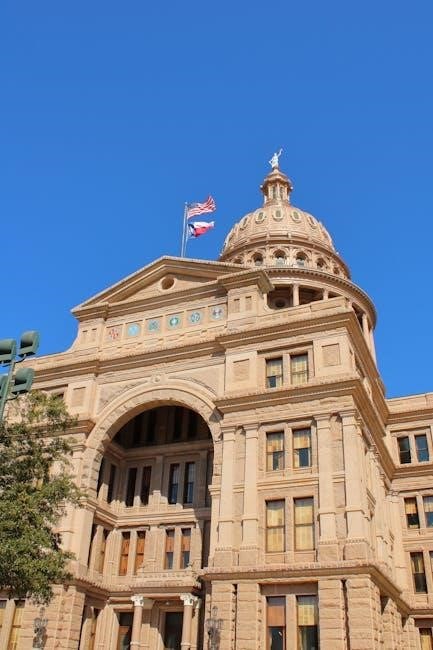Texas Politics: Ideal and Reality explores the state’s political landscape, examining democratic ideals, conservatism, and private influence․ It delves into real-world implications of these themes․
Overview of the Book and Its Themes
Texas Politics: Ideal and Reality examines the state’s political system through three core themes: democratic ideals, political conservatism, and private influence․ It explores how these themes shape Texas’s governance, policies, and cultural identity․ The book provides a comprehensive analysis of the state’s political landscape, highlighting real-world implications and contemporary issues like immigration and climate change, offering insights into the gap between theoretical ideals and practical realities․
Importance of Studying Texas Politics
Studying Texas politics is essential for understanding its significant influence on national governance and policy-making․ As a politically powerful state, Texas shapes American federalism and national elections․ Its diverse political culture, economic might, and unique challenges offer insights into broader U․S․ political dynamics․ Examining Texas’s governance helps illuminate how ideals align with realities, making it a crucial case study for grasping contemporary political trends and controversies, from immigration to climate change․

The Ideals of Democratic Theory in Texas Politics
The ideals of democratic theory in Texas politics emphasize representation, equality, and accountability․ These principles shape the state’s political framework and its unique identity․
Core Democratic Principles and Their Relevance
Core democratic principles such as representation, accountability, and transparency are central to Texas politics․ These ideals ensure that government actions reflect the will of the people, maintaining trust and legitimacy․ Free and fair elections, equality before the law, and the protection of individual rights are essential components․ These principles guide policy-making and governance, ensuring that power remains with the people while addressing modern challenges like voter access and political representation․
Historical Context of Democratic Ideals in Texas
The historical context of democratic ideals in Texas is deeply rooted in its founding as a republic and later as the 28th state․ Early principles of self-governance and individual rights shaped its political identity․ The state’s constitutional history reflects ongoing tensions between democratic ideals and political realities, evolving through periods of Reconstruction, civil rights movements, and modern-day debates over voting rights and representation, influencing its unique political culture․

Political Conservatism in Texas
Texas’s political landscape is dominated by conservatism, with Republican control shaping policies․ The state’s shift from Democratic to Republican reflects its cultural and ideological alignment with conservative values․
Republican Dominance and Its Impact
Republican dominance in Texas has shaped policy, emphasizing limited government and fiscal conservatism․ This control influences immigration, climate change responses, and social issues, reflecting voter priorities and cultural values․
Conservative Policies and Their Effects on State Governance
Conservative policies in Texas prioritize fiscal restraint and limited government intervention․ This approach impacts education, healthcare, and infrastructure, often leading to debates over resource allocation and service quality․ These policies reflect the state’s political culture but also face challenges in addressing growing demographic and economic needs․

Private Influence Over Public Policy
Private interests significantly shape Texas policy through lobbying and campaign finance, often influencing legislation and governance to serve specific agendas over public welfare․
Role of Lobbying and Special Interest Groups
Lobbying and special interest groups play a pivotal role in shaping Texas policy, often prioritizing corporate or ideological agendas over public welfare․ These groups utilize campaign contributions, advocacy, and strategic relationships to influence legislation, particularly in industries like energy and healthcare․ Their impact underscores the tension between democratic ideals and the realities of private influence in governance, raising ethical concerns about representation and equity in policymaking processes․
Campaign Finance and Its Implications
Campaign finance in Texas significantly influences political outcomes, with large donors and corporations often holding disproportionate sway over elections and policy decisions․ This creates a power imbalance, where financial resources can shape legislative agendas and public priorities․ Such practices raise ethical concerns about equality in representation and the potential for undue influence, highlighting the gap between democratic ideals and the realities of money-driven politics․
Texas Political Culture
Texas’s political culture reflects a blend of traditional conservatism and modern influences, shaped by its history, regional diversity, and strong independent identity․
Historical Development of the State’s Political Identity
Texas’s political identity has evolved through its history as an independent republic, Civil War secession, and Reconstruction․ Early influences of frontier individualism and agriculture shaped conservatism, while the 20th century saw shifts in party dominance and policy priorities․
Regional Variations in Political Attitudes
Texas exhibits significant regional political variations, with urban areas like Houston and Dallas leaning Democratic, while rural areas remain strongly Republican․ The Rio Grande Valley, influenced by Hispanic culture, often aligns with progressive policies․ These regional differences reflect diverse economic, cultural, and historical contexts, shaping Texas’s complex political landscape․
Texas Economy, Taxes, and Services
Texas boasts a robust economy driven by energy, agriculture, and technology, with low taxes and limited government services․ This approach sparks debates over public service funding priorities․
Economic Policies and Their Political Ramifications
Texas’s economy thrives on energy, agriculture, and technology, driven by low-tax policies․ These policies foster growth but spark debates over underfunded public services, highlighting tensions between economic freedom and social needs․
State Spending and Budget Priorities
Texas allocates its budget to education, healthcare, and infrastructure, reflecting conservative fiscal priorities․ Limited spending on social programs often leads to political debates about equity and resource distribution․
The People of Texas: Diversity and Representation
Texas’s growing diversity shapes its political landscape, with shifting demographics influencing elections and representation․ Urban-rural divides and minority voices increasingly impact policy and governance in the state․
Demographic Changes and Their Political Impact
Texas has experienced significant demographic shifts, with a growing Hispanic population and urbanization trends․ These changes are reshaping voter demographics, influencing election outcomes, and altering political priorities․ The increasing diversity challenges traditional party strongholds and necessitates adaptive strategies to address emerging constituent needs and preferences, ultimately affecting policy directions and governance structures across the state․
Representation in State and Federal Governments
Texas’s representation in state and federal governments reflects its diverse population and evolving political landscape․ State legislators and federal representatives aim to voice constituent interests, ensuring equitable policies․ However, challenges like gerrymandering and voter access issues impact fair representation․ Effective governance requires balancing diverse perspectives to address the needs of all Texans, fostering inclusivity and accountability in both state and national political arenas․

Texas in the Context of American Federalism
Texas plays a significant role in American federalism, balancing state autonomy with federal collaboration․ Its size and influence shape national policies, reflecting its unique political identity and priorities․
State-Federal Relations and Conflicts
Texas frequently experiences tension with the federal government, particularly over issues like immigration, healthcare, and environmental regulations․ These conflicts often stem from differing interpretations of state sovereignty versus federal authority, reflecting Texas’s strong identity as a politically conservative state․ Such disputes highlight the complexities of federalism, as Texas asserts its independence while navigating national policies and legal frameworks that impact its governance and economy․
Texas as a Political Powerhouse in National Elections
Texas plays a pivotal role in national elections due to its large population and significant electoral college votes․ Its political influence is amplified by its conservative leaning, shaping Republican strategies․ The state’s diverse demographics and growing voter turnout also make it a focal point for both parties, as seen in recent elections, where Texas’s political landscape continues to evolve, impacting the nation’s political direction and priorities․
Texas in the International Arena
Texas engages in robust international relations, particularly with Mexico, fostering economic partnerships and cultural exchanges that enhance its global influence and trade opportunities․
Texas-Mexico Relations and Border Politics
Texas-Mexico relations are shaped by shared economic interests, cultural ties, and border management challenges․ Collaboration on trade, energy, and environmental issues strengthens bilateral ties, while disagreements over immigration and border security persist․ The region’s unique dynamics influence both state and federal policies, reflecting broader themes of cooperation and conflict in international relations․
Economic and Cultural Ties Beyond the U․S․
Texas’s economy extends globally through energy exports, tech innovation, and agricultural trade․ Its cultural identity, including music and art, fosters international connections, enhancing global influence and political standing․
Challenges and Controversies in Texas Politics
Texas faces contentious issues like immigration, climate change, and voting rights, reflecting broader national debates and impacting its political and social dynamics significantly․
Current Issues Like Immigration, Climate Change, and Voting Rights
Texas grapples with contentious issues such as immigration enforcement, climate change impacts, and voting rights debates․ These challenges reflect national trends, with immigration policies sparking intense political and social divides․ Climate change exacerbates natural disasters, prompting debates on environmental regulation․ Voting rights controversies, including voter ID laws and election integrity, highlight tensions over access to democracy․ These issues shape Texas’s political landscape and its role in national conversations․
The Role of Media and Public Perception
Media significantly influences public perception of Texas politics, shaping opinions on key issues like immigration and voting rights․ Coverage often highlights partisan divisions, amplifying political polarization․ Social media platforms accelerate the spread of information, sometimes fostering misinformation․ Public perception, in turn, drives political agendas, as leaders respond to constituent concerns․ This dynamic underscores the critical role of media in framing Texas’s political narrative and its broader impact on governance and policy-making․
Texas’s political future hinges on balancing demographic shifts, evolving policies, and voter engagement․ Emerging trends suggest a dynamic landscape where leadership must bridge ideals and practical realities effectively․
Emerging Trends and Their Potential Impact
Emerging trends in Texas politics include shifting demographics, climate change policies, and immigration debates․ These issues are reshaping political priorities and voter engagement․ The rise of technology in elections and increasing youth participation also promise to influence future outcomes․ Additionally, the growing influence of independent voters and the evolution of party dynamics could significantly alter the state’s political landscape, creating both opportunities and challenges for governance and representation․
Bridging the Gap Between Ideal and Reality
Bridging the gap between ideal and reality in Texas politics requires fostering collaboration across political divides․ By addressing issues like immigration and climate change, policymakers can align actions with democratic ideals․ Transparency, accountability, and inclusive decision-making are key to narrowing the divide․ Engaging citizens through education and participation can also help ensure that governance reflects the state’s diverse needs and aspirations, creating a more equitable and responsive political system․
